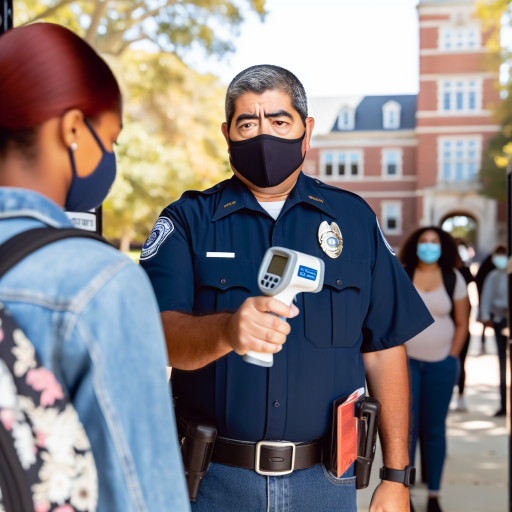Introduction:
Campus security refers to the measures put in place to protect students, staff, and faculty from harm.
In crisis situations, campus security plays a crucial role in maintaining order and ensuring the safety of everyone on campus.
This blog post will discuss the importance of campus security in crisis management.
We will explore the different strategies and protocols that are involved in effectively handling emergencies on campus.
Importance of Proactive Measures
Proactive measures taken by campus security are essential in identifying and mitigating potential risks.
By staying vigilant and prepared, security teams can effectively prevent incidents that could endanger the campus community.
Surveillance Systems
One successful prevention strategy is the installation of surveillance systems across the campus.
These systems provide 24/7 monitoring and help security teams detect suspicious activities.
Access Control
Access control measures regulate who enters the campus, reducing the risk of unauthorized individuals.
Emergency Response Training
Training programs on emergency response play a crucial role in crisis prevention.
Campus security teams undergo regular drills, ensuring swift and effective responses in emergencies.
Examples of Successful Prevention Strategies
Numerous instances showcase campus security’s proactive measures in preventing crises.
For example, security teams respond promptly to reports of suspicious activity, apprehending potential threats early.
Increased Patrols
Increasing foot patrols in high-risk areas proves effective in deterring criminal activities.
Collaboration with Law Enforcement
Security teams often collaborate with local law enforcement to enhance prevention efforts.
By sharing information and resources, they address potential threats more effectively.
Regular Risk Assessments
Conducting regular risk assessments is crucial for identifying vulnerabilities.
Implementing mitigation measures allows security teams to prevent crises proactively.
Crisis Management in Campus Security
In times of crisis on campus, campus security plays a crucial role in ensuring safety.
They protect the well-being of students, faculty, and staff.
Here is a detailed look at how campus security responds to crises.
It covers the importance of quick and efficient response times.
Additionally, it includes examples of crisis response protocols.
Procedures Followed by Campus Security
-
Assessment: The first step in crisis management is assessment.
Campus security teams quickly gather information to determine the nature and severity. -
Communication: Effective communication is key during a crisis.
Campus security communicates with law enforcement and stakeholders to coordinate a response. -
Activation of Emergency Response Plans: Campus security activates response plans tailored to specific crises.
This includes natural disasters and health emergencies. -
Evacuation and Sheltering: Depending on the crisis, campus security may initiate evacuation procedures.
They move individuals to safety or establish shelter locations. - Coordination with External Agencies: Campus security collaborates with external agencies.
They ensure a comprehensive and coordinated response.
Importance of Quick Response Times
-
Lives Saved: Quick response can mean the difference between life and death.
Prompt actions by campus security can save lives. -
Minimizing Damage: Rapid response helps contain the impact of a crisis.
This reduces potential damage to property and infrastructure. -
Restoring Normalcy: Swift response allows a quicker return to normal operations.
This minimizes disruptions to academic activities. -
Maintaining Public Trust: Timely responses build trust in the security team.
Confidence grows among students, faculty, and staff.
Examples of Crisis Response Protocols
-
Active Shooter Response: Training includes active shooter drills.
Protocols involve lockdown procedures and engagement tactics. -
Severe Weather Preparedness: Security monitors weather conditions.
Alerts are issued for severe weather events. -
Medical Emergencies: Security teams are trained in first aid and CPR.
Their protocols involve assessing situations and providing aid. -
Fire Safety: Campus security conducts fire drills.
They enforce fire safety protocols for orderly evacuations.
Uncover the Details: Emergency Response: Role of Bomb Squad Technicians
Collaborating with other campus resources:
Importance of campus security working together with other departments and resources during a crisis:
In times of crisis, it is crucial for campus security to collaborate with other departments and resources on campus.
This collaboration ensures a coordinated and effective response to the crisis at hand.
Campus security may have specialized training in handling security threats.
However, they may not have the expertise or resources to manage other aspects of a crisis, such as medical emergencies or mental health issues.
By working together with other departments like the health center, counseling services, or student affairs, campus security can ensure that all aspects of the crisis are addressed comprehensively.
Benefits of a coordinated response in crisis management:
- Faster response times: When campus security collaborates with other departments, they can leverage the resources and expertise of each department to respond quickly and efficiently to a crisis.
- Comprehensive approach: By working together, campus security and other departments can address all aspects of a crisis, including security, medical, mental health, and logistical issues.
- Enhance communication: Collaborating with other departments ensures clear and effective communication during a crisis, preventing misunderstandings and ensuring that everyone is on the same page.
- Improved outcomes: A coordinated response increases the likelihood of a successful outcome during a crisis, as all departments are working towards a common goal and utilizing their strengths to address the situation.
Examples of successful collaborations between campus security and other campus resources:
- Active shooter response drills: Campus security, local law enforcement, and emergency medical services may collaborate to conduct active shooter drills to practice their response during an emergency.
- Mental health crisis intervention team: Campus security, counseling services, and student affairs may work together to form a mental health crisis intervention team to respond to mental health emergencies on campus.
- Emergency preparedness committees: Campus security may collaborate with various departments to form emergency preparedness committees that develop crisis management plans and protocols for different types of emergencies.
Collaborating with other campus resources is essential for campus security to effectively manage crises and ensure the safety and well-being of the campus community.
Explore Further: Top Security Consulting Firms in the USA
Communication strategies during a crisis:
Effective communication plays a crucial role in crisis management on campus.
It ensures that accurate information is disseminated promptly to all stakeholders.
This includes students, faculty, and staff.
Clear and timely communication is vital in maintaining calmness and order during emergencies.
Role of effective communication in crisis management on campus:
During a crisis, campus security teams must utilize various communication channels.
This helps provide accurate and timely information to all individuals on campus.
It ensures that everyone is aware of the situation and knows what actions to take.
Effective communication helps in coordinating response efforts.
It ensures that resources are allocated efficiently.
Importance of clear and timely communication with students, faculty, and staff:
Clear and timely communication with students, faculty, and staff is essential.
It helps ensure their safety and well-being during a crisis.
It aids in dispelling rumors and preventing panic.
Transform Your Career Today
Unlock a personalized career strategy that drives real results. Get tailored advice and a roadmap designed just for you.
Start NowAdditionally, it provides guidance on how to respond appropriately.
By keeping everyone informed, campus security teams can maintain control over the situation.
This minimizes disruptions to normal operations.
Examples of communication strategies used by campus security teams during crises:
- Emergency alerts: Sending out mass notifications via text messages, emails, social media, and sirens to alert the campus community about an ongoing crisis.
- Press releases: Issuing official statements to the media to provide updates and address any inquiries from the public.
- Public address systems: Using loudspeakers in strategic locations on campus to broadcast important announcements and instructions.
- Virtual town halls: Hosting online meetings to communicate with a large audience and answer questions in real-time.
- Collaboration with local authorities: Working closely with law enforcement and emergency responders to coordinate communication efforts and share critical information.
By employing these communication strategies, campus security teams can effectively manage crises.
They maintain order and ensure the safety of all individuals on campus.
Delve into the Subject: Protective Services: Role of U.S. Marshals
Training and Preparation for Crisis Situations
Ongoing training for campus security teams is crucial for preparing for crises.
Regular drills and simulations help improve response times during emergencies.
Examples of training programs include active shooter drills, first aid training, and crisis communication exercises.
Training is a fundamental aspect of crisis management for campus security teams.
It equips them with the necessary skills and knowledge to effectively respond to various emergencies that may arise on campus.
Without proper training, security personnel may not be able to handle crisis situations efficiently.
This can lead to potential harm to individuals and property.
One of the key benefits of ongoing training is that it keeps security teams up-to-date with the latest security protocols and procedures.
As the nature of threats continues to evolve, it is essential for security personnel to stay informed about best practices in crisis management.
By participating in regular training sessions, security teams can enhance their preparedness and readiness to respond effectively to emergencies.
Regular drills and simulations play a vital role in improving response times during crises.
These exercises provide security teams with practical experience.
They allow them to practice their emergency response protocols in a controlled environment.
Showcase Your Business Today
Reach thousands of readers actively exploring professional services. Publish your business profile and grow your audience now.
Publish NowBy simulating different crisis scenarios, security personnel can identify areas for improvement and make necessary adjustments to their response strategies.
One common example of a training program for campus security teams is active shooter drills.
These drills simulate an active shooter situation on campus.
They help security personnel understand how to respond quickly and decisively to neutralize the threat.
By conducting regular active shooter drills, security teams can familiarize themselves with their roles and responsibilities during such emergencies.
This ultimately improves their ability to protect the campus community.
In addition to active shooter drills, first aid training is another essential component of campus security preparedness.
Security personnel who are trained in first aid can provide immediate medical assistance to individuals who may be injured during a crisis.
By equipping security teams with the skills to administer first aid, campuses can ensure that injured individuals receive timely and appropriate care until professional medical help arrives.
Crisis communication exercises are also critical for enhancing campus security preparedness.
These exercises simulate communication challenges that may arise during emergencies.
Examples include coordinating responses with law enforcement agencies or disseminating timely alerts to the campus community.
By conducting crisis communication exercises, security teams can improve their ability to communicate effectively during crises.
This ensures that accurate and timely information is shared with all stakeholders.
Ongoing training and preparation are essential for campus security teams.
They must effectively respond to crisis situations.
By participating in regular training programs, drills, and simulations, security personnel can enhance their preparedness and improve their response times.
This ensures the safety and security of the campus community in the face of emergencies.
Learn More: Detective Associations in the USA: Networking and Support

Collaboration with Law Enforcement
In times of crisis, campus security teams often work hand in hand with local law enforcement agencies to ensure a swift and coordinated response.
This collaboration is crucial in ensuring the safety and security of everyone on campus.
Campus security teams typically have a close working relationship with law enforcement, allowing for seamless communication and coordination during crises.
This partnership enables both parties to leverage their respective expertise and resources for a more effective response.
During a crisis, campus security teams may rely on law enforcement for support, such as securing the perimeter or providing tactical assistance.
Law enforcement agencies benefit from the knowledge that campus security teams have of the campus layout.
Benefits of a Coordinated Effort
A coordinated effort between campus security and law enforcement offers several advantages in crisis management.
Pooling resources and expertise leads to a comprehensive and efficient response.
By working together, campus security and law enforcement can share information and coordinate their actions.
This ensures efforts are not duplicated and everyone is on the same page during a crisis.
Additionally, a coordinated effort establishes clear lines of communication, essential for managing the flow of information.
This structured approach minimizes confusion and enhances overall coordination.
Successful Partnerships
There are numerous examples of successful partnerships between campus security and law enforcement.
One such example is the collaboration between the University of Texas Police Department and the Austin Police Department.
During the Austin bombings in 2018, these agencies coordinated their responses and shared intelligence effectively.
This effort played a crucial role in ensuring the safety of the community.
Another successful partnership is between the Pennsylvania State University Police and the State College Police Department.
Together, these agencies have developed emergency response plans and conducted joint training exercises.
These partnerships exemplify the importance of strong relationships and effective communication.
By working together, these entities can enhance their preparedness and response capabilities.
Ultimately, this collaboration safeguards the campus community during crises.
Showcase Your Business Today
Reach thousands of readers actively exploring professional services. Publish your business profile and grow your audience now.
Publish NowPost-crisis management and recovery:
After a crisis has occurred on a campus, the role of campus security becomes crucial in managing the aftermath.
Campus security teams are responsible for ensuring the safety and well-being of all individuals affected by the crisis.
Role of campus security in managing the aftermath of a crisis:
- Provide immediate support to those affected
- Secure the campus to prevent further incidents
- Coordinate with emergency services and responders
- Communicate with campus community about the situation
- Conduct thorough investigations to determine the cause
Importance of providing support and resources:
- Help individuals cope with trauma and distress
- Offer counseling services and mental health support
- Ensure access to medical care for physical injuries
- Assist in reunification of families and friends
- Establish a support network for ongoing care
Examples of post-crisis management strategies:
- Establishing a crisis response team for immediate assistance
- Setting up a hotline for reporting concerns and seeking help
- Organizing community meetings to address questions and concerns
- Implementing security enhancements to prevent future crises
- Providing training for staff and students on crisis response
Campus security plays a vital role in post-crisis management by providing support, resources, and implementing effective strategies to ensure the recovery and well-being of those affected by a crisis.
Campus Security and Crisis Management
Campus security is vital for effective crisis management.
Security personnel must be prepared to respond quickly to any emergency on campus.
Having a comprehensive crisis management plan is essential.
This plan should include clear protocols for handling different types of crises.
By prioritizing campus security and preparedness, we can create a safer environment.
Students, faculty, and staff will benefit from enhanced safety measures.
All members of the campus community should be vigilant and proactive.
It is crucial to report any suspicious activity or potential threats.
By working together, we can help prevent and mitigate crises.
Let’s prioritize safety and security for everyone on campus.
Additional Resources
Campus Safety, Security & Emergency Management | Everett …
Campus Safety and Emergency Management Services – Student …
[E-Books for Sale]
The Big Book of 500 High-Paying Jobs in America: Unlock Your Earning Potential
$19.99 • 500 High-Paying Jobs • 330 pages
Explore 500 high-paying jobs in America and learn how to boost your career, earn more, and achieve success!
See All 500 High-Paying Jobs of this E-Book
1001 Professions Without a Degree: High-Paying American Jobs You Can Start Now
$19.99 • 1001 Professions Without a Degree • 174 pages
Discover 1001 high-paying jobs without a degree! Unlock career tips, skills, and success strategies for just $19.99!




